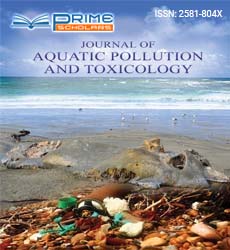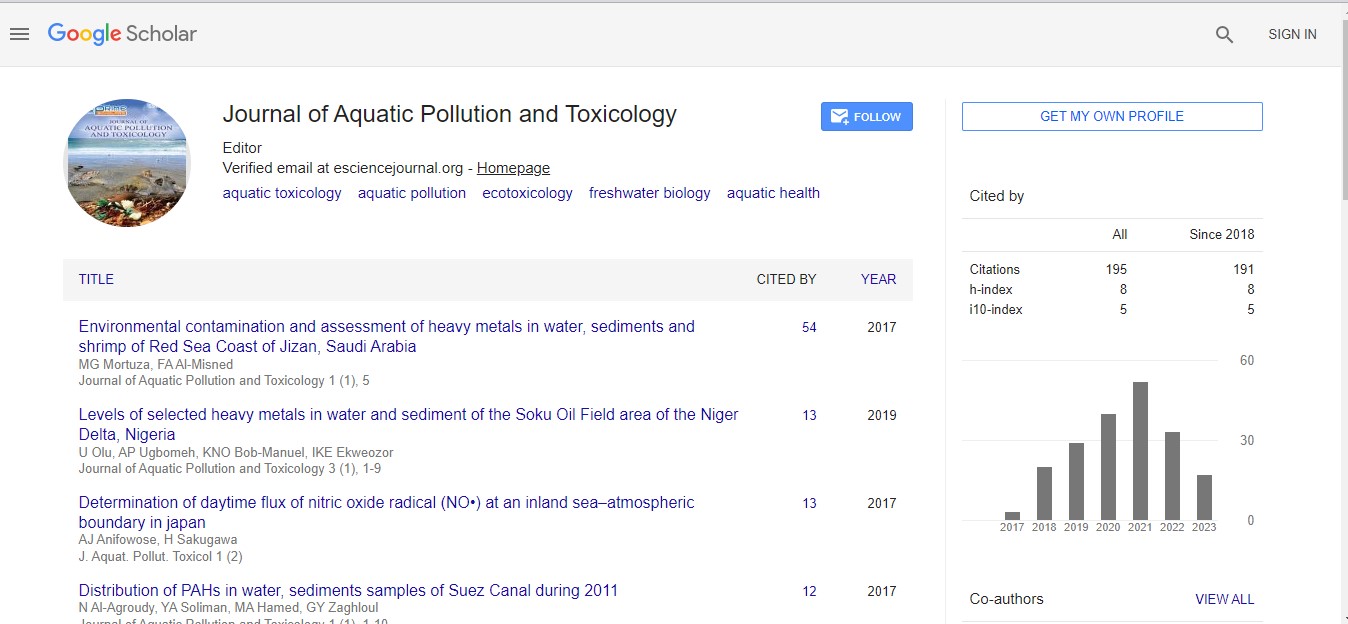Perspective - (2023) Volume 7, Issue 4
Ecotoxicology Unveiling the Impact of Environmental Contaminants on Ecosystem Health
Nicole Bailey*
Department of Oceanography Sciences, Tulane University, USA
*Correspondence:
Nicole Bailey,
Department of Oceanography Sciences, Tulane University,
USA,
Email:
Received: 29-Nov-2023, Manuscript No. IPJAPT-24-18920;
Editor assigned: 01-Dec-2023, Pre QC No. IPJAPT-24-18920 (PQ);
Reviewed: 15-Dec-2023, QC No. IPJAPT-24-18920;
Revised: 20-Dec-2023, Manuscript No. IPJAPT-24-18920 (R);
Published:
27-Dec-2023, DOI: 10.21767/2581-804X-7.4.37
Introduction
In an era where human activities are transforming the planet
at an unprecedented pace, the field of ecotoxicology has
emerged as a crucial scientific discipline. Ecotoxicology delves
into the intricate web of interactions between contaminants
and ecosystems unraveling the consequences of pollutants on
the health and sustainability of our environment. This article
explores the significance of ecotoxicology, its methodologies,
and the pressing need for its insights in mitigating the
environmental challenges posed by various pollutants.
Ecotoxicology is the study of the effects of toxic substances on
the structure and function of ecosystems. Unlike traditional
toxicology, which primarily focuses on individual organisms,
ecotoxicology takes a holistic approach, examining the broader
implications of contaminants on populations, communities,
and entire ecosystems. Field studies involve monitoring and
assessing ecosystems in their natural environment. Researchers
collect samples of water, soil, sediments, and biota to analyze
pollutant levels and their impact on various components of the
ecosystem.
Description
Controlled laboratory experiments allow scientists to
manipulate environmental variables and observe the effects
of specific contaminants on selected organisms. These
experiments help establish cause-and-effect relationships and
quantify the toxicity of substances. Bioaccumulation studies
investigate how contaminants accumulate within organisms
over time. This is particularly important in understanding the
transfer of pollutants through food webs and the potential
for bio-magnification. Mathematical models are employed
to simulate the behavior of contaminants in ecosystems.
These models help predict long-term trends, assess the risks
associated with certain pollutants, and guide environmental
management strategies. Advances in genomics and molecular
biology have allowed researchers to explore the genetic and
cellular responses of organisms to pollutants. This molecularlevel
understanding provides insights into the mechanisms of
toxicity. Metals such as mercury, lead, and cadmium, often
released through industrial activities, can accumulate in
soils and aquatic ecosystems. They pose a threat to aquatic
organisms and can lead to long-term ecological disruption.
Agricultural chemicals, including pesticides and herbicides,
can contaminate water bodies and soil, affecting nontarget
organisms. The runoff of these chemicals can lead to
the development of resistant species and harm beneficial
insects and aquatic life, including certain pesticides and
industrial chemicals, resist degradation and can persist in the
environment for extended periods. These substances can bioaccumulate,
posing a threat to higher trophic levels in food
webs, including humans. The pervasive use of plastics has led
to a global environmental crisis.
Conclusion
Understanding the impact of contaminants on ecosystems
is crucial for conservation and restoration efforts. Ecotoxicological
data can guide the development of strategies
to rehabilitate polluted environments and protect vulnerable
species. Ecotoxicology provides a valuable tool for monitoring
changes in environmental quality over time. By tracking
pollutant levels and their effects, scientists can detect emerging
issues and assess the effectiveness of pollution control
measures. The insights gained from eco-toxicological research
contribute to the development of sustainable practices in
industries, agriculture, and waste management. This includes
the adoption of cleaner technologies and the implementation
of best management practices to minimize environmental
impact. Ecotoxicology serves as a sentinel, alerting us to the
intricate and often hidden consequences of human activities
on our planet’s ecosystems.
Citation: Bailey N (2023) Ecotoxicology Unveiling the Impact of Environmental Contaminants on Ecosystem Health. J Aquat Pollut Toxicol. 7:37.
Copyright: © 2023 Bailey N. This is an open-access article distributed under the terms of the Creative Commons Attribution License, which permits unrestricted use, distribution, and reproduction in any medium, provided the original author and source are credited.

